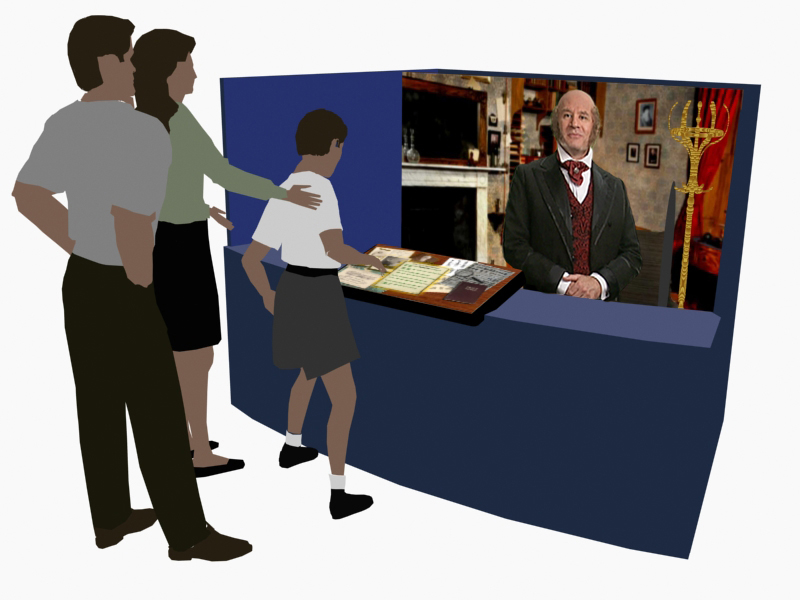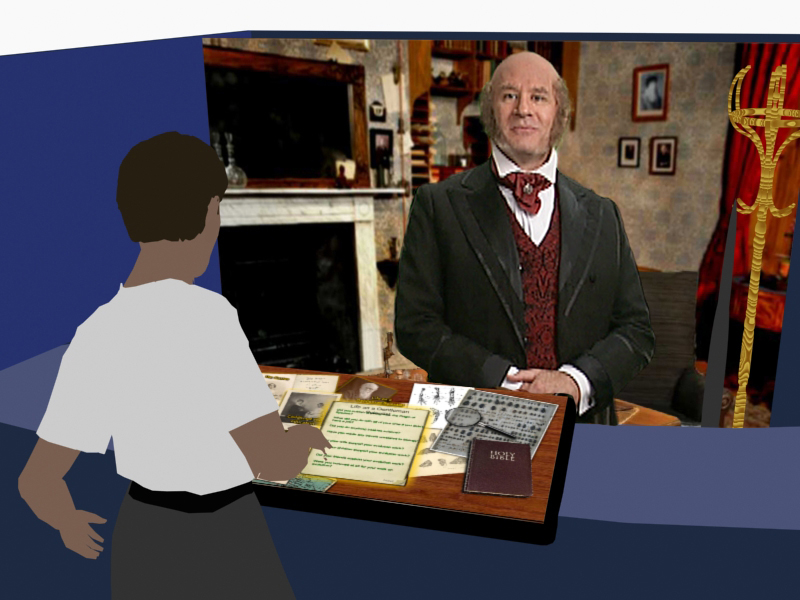Carnegie Mellon's Synthetic Interview Technology Enables Virtual Chats With Darwin's Ghost
Byron SpiceThursday, February 5, 2009Print this page.

PITTSBURGH-Charles Darwin celebrates his 200th birthday this year and, with the help of technology developed by Carnegie Mellon University's Entertainment Technology Center (ETC), the British naturalist has a lot of pent-up stories, theories and opinions to share.
Using the ETC's Synthetic Interview Technology, ETC researchers and Duquesne University biologists have collaborated to create an interactive experience that allows users to question the ghost of Darwin about his adventures, his theory of evolution, the public response to his theory, his personal quirks and a number of other topics. In this way, they can access more than 15 hours of videotaped responses by the ghost, portrayed by Pittsburgh actor and Carnegie Mellon drama alumnus Randy Kovitz, and have virtual conversations that are unique to each user. Video of more than a dozen modern-day biologists, religious authorities and other experts also can be accessed to provide alternative views or answer questions beyond Darwin's 19th century knowledge.
A synthetic interview enables users to interact with video clips so they can explore questions and topics that intrigue or trouble them, rather than passively view a film that simply provides an overview, said Don Marinelli, executive producer of the ETC. This makes a controversial figure such as Charles Darwin an ideal subject for a synthetic interview, particularly this year when we are celebrating the 150th anniversary of his book,On the Origin of Species. Happily, this also turned out to be the most evolutionary implementation of Synthetic Interview Technology to date, in that it incorporates scientific expert testimony that combines Darwin's original theories with the research and discovery that has occurred since his death.
"Ask Darwin" was created for Darwin 2009 A Pittsburgh Partnership, which includes a series of lectures and exhibits throughout Pittsburgh. It is now open as a permanent exhibit at the Carnegie Science Center in Pittsburgh. Discussions are under way to provide different versions at additional museums across the country and plans call for eventually providing a Web-based version for classroom use, said John Pollock, associate professor of biological sciences at Duquesne.
All who interact with the Synthetic Darwin will come away knowing more about the man, his work and the legacy of his science, he said. Pollock and David Lampe, also a Duquesne associate professor of biological sciences, are the producers of Darwin 2009. Funding for the project came from Pollock's Science Education Partnership Award and Darwin Evolution Revolution Award, both from the National Center for Research Resources, a component of the National Institutes of Health.
Synthetic Interview Technology was developed in 1998 by Scott Stevens and Michael Christel, ETC senior systems scientists. With the help of actors, it has been used to create interactive experiences with historic figures such as Benjamin Franklin, Albert Einstein and George Westinghouse. It also has been used with video of actual people, such as Fox Sports NASCAR analysts, and is employed in an upcoming synthetic interview of the late Randy Pausch, a Carnegie Mellon computer scientist, ETC co-founder and author of "The Last Lecture."
In the "Ask Darwin" exhibit, visitors stand at Darwin's desk and see a full-size projection of Darwin standing in his study. They can choose any of 199 questions, on topics ranging from philosophic to personal, and watch Darwin's answer. For the first time in a synthetic interview, supplemental materials that might be relevant to an answer also are displayed. In "Ask Darwin," these materials might include images of Gallapagos turtles, for instance, and are displayed in a picture frame on a mantel behind Darwin.
The inclusion of modern-day experts helps make the experience even more relevant to today's world, said John Dessler, a digital artist and ETC faculty member. Darwin didn't know anything about DNA, for instance, but users who want to know the role of genetics in evolution can click one of the experts who does, he said. This increases the value of the synthetic interview for eventual classroom use.
The questions and the script were derived by Lampe from more than 1,000 surveys of children and adults in the Pittsburgh area. Answers in many cases use Darwin's own words from his books and correspondence.
At the ETC, the project was led by supervising producer Shirley Saldamarco. Ralph Vituccio, director of media-special projects, directed the videotaping, and Dessler wrote the software that retrieves the appropriate video in response to each question.
For more information about synthetic interviews, visit www.etc.cmu.edu/projects/si-studio/. For more information about Darwin 2009 A Pittsburgh Partnership, visit www.duq.edu/darwin2009.
The Entertainment Technology Center is a joint program of Carnegie Mellon's School of Computer Science and College of Fine Arts. The ETC offers a two-year Masters of Entertainment Technology degree. For more information, visit www.etc.cmu.edu/


Byron Spice | 412-268-9068 | bspice@cs.cmu.edu
